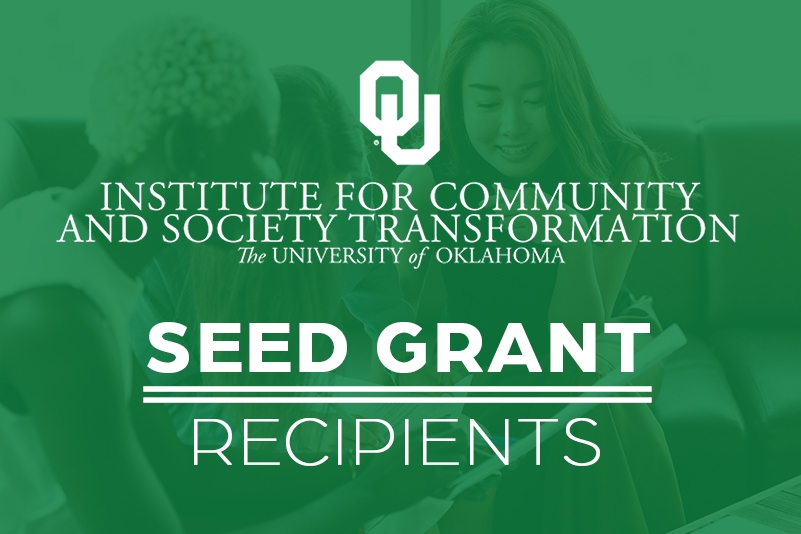The Institute for Community and Society Transformation, with additional funding from the Data Institute for Societal Challenges, has awarded seven seed funding grants to foster the creation or development of multidisciplinary research teams in key areas related to community and society transformation, and to increase the competitiveness of OU multidisciplinary research teams to compete for external funding. This seed grant opportunity focuses on proposals that align with any of the following areas of emphasis: early childhood education & childhood well-being; rural communities, education, and schools; health, society, and the environment; AI in the workplace and AI ethics; refugee, migration, and resettlement related research.
Congratulations to the following seed funding recipients:
- Farina King, Ph.D., and Yang Hong, Ph.D., along with Allen Li, Ph.D., Mengye Chen, Ph.D., Chengbin Deng, Ph.D., and Theresa Tsoodle, were awarded $20,000 from ICAST and $10,000 from DISC for their project, “Interweaving Hydrology and Indigenous Knowledge for Flood-related Environmental Justice with the Otoe-Missouria Tribe.” This project is the first phase of a major collaboration between the Otoe-Missouria Tribe and the University of Oklahoma that aims to improve the safety and wellness of local and Indigenous communities and their environment while amplifying the voices of those most impacted by flooding—specifically the Otoe-Missouria Tribe centered in Red Rock, Oklahoma.
- Wonkyung Jang, Ph.D., Diane Horm, Ph.D., Kyong-Ah Kwon, Ph.D., Ryan Kasak, Ph.D., Kun Lu, Ph.D., and Ji Hwan Park, Ph.D., were granted $20,000 from ICAST and $10,000 from DISC for their project, “Leveraging Big Data to Improve Quality in Infants’ and Toddlers’ Language Learning Environments.” This project will bridge the gap between conceptual questions about the quality of teacher-child language interactions and the methods used to investigate them. It also aims to launch the AI Lab for Transforming Education for Infants and Toddlers to develop advanced AI technologies to capture, trace, and predict the unfolding visual, social, and linguistic processes of infants and toddlers such that no child in need of speech and language interventions is left behind.
- Heyjie Jung, Ph.D., Alexandra Harris-Watson, Ph.D., and Melinda Chen, Ph.D., will receive $25,000 in seed grant funding from ICAST for their project, “Understanding the Impacts of Artificial Intelligence on Workplace Social Networks: A Pilot Study.” This project seeks to explore how the presence of AI affects the formation and development of both types of social networks and ties.
- Kash Barker, Ph.D., Chie Noyori-Corbett, Ph.D., and Andrés González, Ph.D., were awarded $25,513 for their project, “Temporal Networks of Environmental Refugee Resettlement.” This project will develop a novel temporal network optimization model that reflects the optimal flow of refugees from origin to host locations, and expand such a baseline model with parameters and constraints reflective of the social science-driven characteristics of equitable decision-making, location integration and dynamics, and different decision-making perspectives to equip local communities to prepare for a larger global scale human migration due to climate change.
- Dawn Loraas, Ph.D., Cian Brown, Ph.D., and Megan Jester, Ph.D., were granted $25,000 by ICAST for their project, “The Impact of the Built Environment on Elementary Students’ Social and Emotional Learning.” This project will assess an elementary school’s-built environment and social and emotional learning curriculum on select domains in elementary students experiencing social and structural disparities.
- Erin Casey, Ph.D., Lauren Ethridge, Ph.D., Deven Carlson, Ph.D., Charlie Rioux, Ph.D., Courtney Dewhirst, Ph.D., Kyong-Ah Kwon, Ph.D., and Mia Kile, were awarded $25,000 from ICAST for their project, “Studying the Effects of Playing in the 'OU Free Play Lab' on 1st-5th Graders’ Overall Well-being.” This project will pilot test and quantify developmental, behavioral, neural and child well-being outcomes of introducing the OU Free Play Lab into a public school setting where children can engage in free play on a weekly basis.
- Jonathan Ye, Ph.D., and Eric Day, Ph.D., will receive $10,000 in seed grant funding from ICAST for their project, “Intelligent bots, robotic process automation, and workplace redesign: A multi-level model of intelligent bot adoption on engagement, job crafting, and performance.” This project will integrate theories of technology adoption, organizational change, job engagement and crafting, and team dynamics to build and test a multilevel model of RPA adoption that includes antecedent, adoption, and outcome factors across the individual-worker, team and organizational levels.


